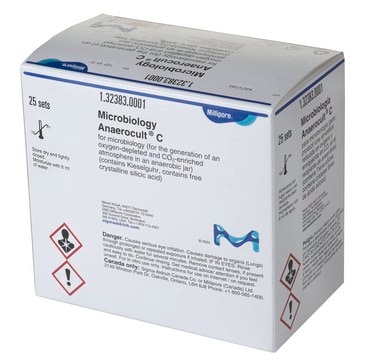39851
HybriScan™I Alicyclobacillus
suitable for microbiology
Synonym(s):
Alicyclobacillus HybriScan™ I
About This Item
Recommended Products
shelf life
limited shelf life, expiry date on the label
Quality Level
application(s)
microbiology
storage temp.
2-8°C
General description
Application
Features and Benefits
- Sensitivity (cfu/assay): 1000
Legal Information
Signal Word
Danger
Hazard Statements
Precautionary Statements
Hazard Classifications
Carc. 2 - Eye Dam. 1 - Met. Corr. 1 - Repr. 1B - Resp. Sens. 1 - Skin Corr. 1A - STOT RE 2 Oral
Target Organs
Blood
Storage Class Code
6.1C - Combustible acute toxic Cat.3 / toxic compounds or compounds which causing chronic effects
Choose from one of the most recent versions:
Certificates of Analysis (COA)
Sorry, we don't have COAs for this product available online at this time.
If you need assistance, please contact Customer Support.
Already Own This Product?
Find documentation for the products that you have recently purchased in the Document Library.
Related Content
Alicyclobacillus are acidophilic, strictly aerobic, and spore-forming spoilage bacteria that can cause increased turbidity, color changes and unpleasant sensory properties in juices. Testing is performed according to IFU method No 12 (2019).
Our team of scientists has experience in all areas of research including Life Science, Material Science, Chemical Synthesis, Chromatography, Analytical and many others.
Contact Technical Service









